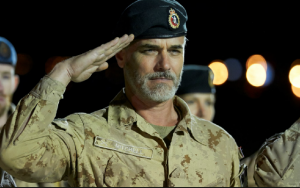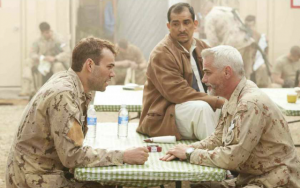Telefilm Canada & Birks honour 12 Canadian women at the Birks Diamond Tribute
 For a fourth year in a row, Telefilm Canada and Birks, have partnered to celebrate Canadian women in film during the Toronto International Film Festival (TIFF). The 2016 honourees of the Birks Diamond Tribute to the Year’s Women in Film are directors Tracey Deer, Ann Marie Fleming, April Mullen, Léa Pool and Ann Shin; actors Amanda Crew, Caroline Dhavernas, Christine Horne, Sandra Oh and Jennifer Podemski; as well as scriptwriters Emma Donoghue and Marie Vien.
For a fourth year in a row, Telefilm Canada and Birks, have partnered to celebrate Canadian women in film during the Toronto International Film Festival (TIFF). The 2016 honourees of the Birks Diamond Tribute to the Year’s Women in Film are directors Tracey Deer, Ann Marie Fleming, April Mullen, Léa Pool and Ann Shin; actors Amanda Crew, Caroline Dhavernas, Christine Horne, Sandra Oh and Jennifer Podemski; as well as scriptwriters Emma Donoghue and Marie Vien.
The 12 Canadian women actors, directors, and scriptwriters were selected by a pan-Canadian jury of 20 journalists and bloggers covering the world of arts, culture and entertainment. The recipients will be honoured on Monday, September 12, 2016 at an invite-only event at the Shangri-La Hotel, Toronto.
“The 2016 edition of the Birks Diamond Tribute to the Year’s Women in Film showcases diversity—that of our industry and our country. Among the honourees are rising stars and established talent, as well as filmmakers who have distinguished themselves in a wide variety of genres and styles,” said Carolle Brabant, Telefilm Canada’s Executive Director. “It is essential to promote the dynamism that these women bring to cinema, both at home and abroad. They are true stars and we want all Canadians to be proud of them!”
“Birks is extremely proud to recognize Canadian female talent in film for the fourth year in a row during TIFF. This year’s honourees are highly deserving of the reward and demonstrate that in every category of film, from writers to directors to on screen, women are leading the way. Canadian women are setting the bar extremely high,’’ added Eva Hartling, Vice President, Marketing & Communications of Birks Group Inc.
Amanda Crew, actor, is well known for her performance in the comedy Sex Drive, which was followed by a role in the supernatural thriller The Haunting in Connecticut. She also played the lead in the films Repeaters, Sisters & Brothers and Charlie Zone. Since 2014, she has been portraying Monica on the HBO sitcom Silicon Valley.
Tracey Deer, director, has made fiction films and the documentaries Club Native and Mohawk Girls, the latter of which she turned into a TV series. Her work has been honoured with two Gemini awards and has earned acclaim at the Hot Docs festival. She has worked with the CBC, the National Film Board of Canada and independent production companies. In 2008, Playback declared her one of the rising stars in the entertainment industry.
Caroline Dhavernas, actor, has over 50 film and television credits to her name. She is the recipient of two Gémeaux Awards for the series Zap and Tag, and has also drawn praise for her work on Mars et Avril and Blue Moon. Her American filmography includes the series Wonderfalls and Hannibal, as well as the film Hollywoodland with Adrien Brody.
Emma Donoghue, scriptwriter, is also a very successful novelist. She adapted the script for Room, the Canadian-Irish coproduction that won at the Oscars and at the Canadian Screen Awards, from one of her novels. The film was nominated for more than 100 awards from around the world. She has also written a short film, Pluck, and is working on the screen adaptation of her latest book, Frog Music.
Ann Marie Fleming, director, has over 30 award-winning films to her credit, focusing on family, history and identity. In June 2016, her film Window Horses was shown in competition at the Annecy International Animated Film Festival. In 2010, I Was a Child of Holocaust Survivors made the Toronto International Film Festival’s Canada’s Top Ten list.
Christine Horne, actor, has worked in film, television and theatre. She is known for her outstanding performance in The Captive, Hyena Road and Stories We Tell and has also appeared on Republic of Doyle. She won a Best Performance Canadian Screen Award for her guest role in the TV series, Remedy.
April Mullen, director, has just completed the feature film Below Her Mouth, which was shot entirely by an all-female crew. Previously, Dead Before Dawn 3D marked Mullen as the first-ever woman to direct a live-action stereoscopic 3D feature and took home the Perron Crystal Award. Her other films include 88, which has sold in over 22 territories, and Badsville, slated to begin its festival run this year.
Sandra Oh, actor, known for roles in award-winning television series and feature films including Double Happiness, Last Night, Sideways, Rabbit Hole, among others. One of her most notable roles includes her portrayal of fan favourite “Dr. Cristina Yang” in the long running, hit series Grey’s Anatomy, for which she garnered Golden Globe, Emmy and SAG award nominations. Most recently, she stars as the voice of “Rosie Ming” in Ann Marie Fleming’s upcoming animated film Window Horses, which she also produced.
Jennifer Podemski, actor, has enjoyed a 25-year career and in recent years has appeared in Jimmy P., Take This Waltz, Empire of Dirt and Fire Song. She was co-executive producer of the Indspire Awards, which recognizes achievements made by Indigenous Canadians, and is host of Seventh Generation, a television series for Aboriginal youth who speak Hebrew and Ojibwa/Saulteaux.
Léa Pool, director, has made her mark on Canadian cinema history with over 15 works. Her latest offering, La Passion d’Augustine, took home six awards at the Gala du cinéma québécois, including Best Film. She has garnered tremendous international acclaim for films such as Emporte-moi, La Femme de l’hôtel and the documentary L’Industrie du ruban rose.
Ann Shin, director, has recently helmed My Enemy, My Brother, the 2016 Oscar-nominated documentary short, and The Defector: Escape from North Korea. She has won three Canadian Screen Awards including the Diversity Award. Her talent is also celebrated in Asia.
Marie Vien, scriptwriter, made quite the debut with her work on La Passion d’Augustine, winner of Best Film at the 2016 Gala du cinéma québécois as well as the Audience Award at the Mill Valley Film Festival. She has also created many variety shows and enjoyed renown for her work on youth documentary series, including M’aimes-tu?
Nomination process and jury
In addition to an internal committee, this year, for the first time, Telefilm and Birks called upon the industry to be a part of the nomination process for the Birks Diamond Tribute to the Year’s Women in Film, namely the Alliance of Canadian Cinema, Television and Radio Artists (ACTRA), the Association des réalisateurs et réalisatrices du Québec (ARRQ), the Directors Guild of Canada (DGC), the Société des auteurs de radio, télévision et cinéma (SARTEC) and the Writers Guild of Canada (WGC).
Telefilm and Birks brought together a jury of 20 people, representing the largest panel in the event’s four-year history. The pan-Canadian jury is made up of renowned journalists and bloggers covering arts, culture and entertainment: Victoria Ahearn (The Canadian Press), Katie Bailey (Playback), Ilana Banks (CBC News, Arts & Entertainment), Linda Barnard (Toronto Star), Richard Crouse (Metro), Laura deCarufel, (thekit.ca), Maxime Demers (Journal de Montréal), Noreen Flanagan (Elle Canada), Dana Gee (The Province), Teri Hart (CityTV BT), Marc-André Lussier (La Presse), Randall King (Winnipeg Free Press), Katherine Monk (Global, CBC, Corus), Bernadette Mora (Fashion Magazine), Ingrid Randoja (Cineplex Magazine), Kiva Reardon (freelance journalist), Johanna Schneller (The Globe and Mail), Odile Tremblay (Le Devoir), Will Wong (Mr. Will Wong) and Natalia Wysocka (Métro).
The committee members took into consideration the work of women who are part of the new generation of exceptional talent in our milieu; and who throughout their careers have used their creative talent to greatly contribute to the growth of the industry.


